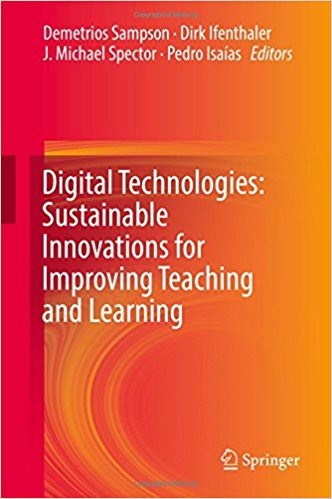Date Reviewed: April 15, 2020
Graduate theological education is experiencing a variety of upheavals, including learning how to navigate the digital technologies transforming the teaching-learning process. Navigating these changes necessitates that graduate theological schools and seminaries adopt the mindset of an educational technology company.
Editors Sampson, Ifenthaler, Spector, and Isaías have assembled a collection of international research articles in Digital Technologies: Sustainable Innovations for Improving Teaching and Learning. The articles are organized around four themes: “Transforming the Learning Environment,” “Enriching Student Learning Experiences,” “Measuring and Assessing Teaching and Learning with Educational Data Analysis,” and "Cultivating Student Competencies or the Digital Smart Society.” The rich data found in each of the articles will assist institutions in asking good questions as they seek to discern the instructional tools they will employ to enhance learning.
The essays address the use of digital technologies principally in either a K-12 environment or college-level STEM programs. Despite their focus on different educational contexts, the essays are helpful in explaining the role digital technologies are playing in the educational environment and challenging one to think imaginatively about the implications for graduate theological education.
Wrestling with the articles was enjoyable but imagining how they apply to theological education was enlightening and frustrating at the same time. The articles lack a shared definition of “learning,” this combined with the ends/outcomes of education being implied made assessing the educational value for theological education difficult. In the end, imagining the implications of these articles for theological education was more like making conjectures or discussion starters rather than the bases for working hypotheses.
Digital Technologies will serve as a helpful resource when evaluating digital technologies for inclusion in an institution’s educational strategy. The international character and depth of the articles help one ask good educational questions when evaluating digital learning tools. Asking good technological questions consistent with one’s theological heritage is consistent with being an educational technology company, especially as theological institutions seek to be more nimble in identifying, assessing, evaluating, and implementing sustainable digital technology to enhance learning.
